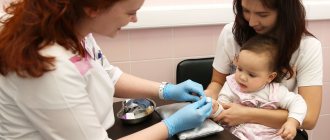Sooner or later, any married couple comes to the decision that it is time for them to acquire heirs. But having suffered failure after failure in conceiving a baby, future parents despair, and quarrels and accusations often arise against each other. It must be remembered that even a woman bursting with health is unlikely to get pregnant the first time . There can be a lot of origins. For example, it is not possible to get pregnant due to an unsuccessful cycle or due to the individual physiological characteristics of the woman. In this matter, there is no need to rush things, get nervous, or set yourself negative attitudes. Doctors have established a conditional period, after which it can be assumed that the couple may have problems with conception. If a woman is unable to get pregnant after living an intimate life without contraception for a year, then you can hear the gynecologist’s verdict - she is infertile .
There is no need to despair, everything can be fixed, the main thing is to take the necessary tests and, if something happens, undergo treatment. To avoid such difficulties when it is not possible to get pregnant within the desired period of time, pregnancy planning should be carried out in advance. Namely, a few months before the expected and desired date of conception, undergo the entire course of tests. But unfortunately, it is very rare when a couple themselves expresses a desire and undergoes examinations before planning a pregnancy.
Why you can’t get pregnant the first time: reasons
Many people are tormented by the question: how long does it take to get pregnant? Even women who are 100% healthy are not always likely to get pregnant the first time.
The reasons may be different. This may simply be a physiological feature; pregnancy will occur, but a little later. Perhaps the cycle coincided unsuccessfully, not during ovulation, so it was not possible to conceive a child.
And you shouldn’t run out in the morning, take a pregnancy test, and then think about why you didn’t get pregnant the first time. The fact is that pregnancy may not occur immediately, but after a couple of days, because sperm remain active during this time and can fertilize the egg. In general, it is better not to rush, especially not to sound the alarm if healthy people fail to get pregnant within six months.
There are couples who cannot get pregnant for almost a year, what to do then? If more than a year has passed and you are unable to get pregnant, you need to contact specialists, and both partners, take all the tests and undergo examinations. Sometimes no pathologies are found in either one or the other.
Perhaps it’s all about the psychological mood, fatigue, stress and you just need to rest.
It happens that a woman sets herself up for pseudo-infertility: I want a child, but I can’t get pregnant. By creating a stressful situation for herself, she really cannot see the two long-awaited lines on the test for a long time.
If the cause is physiological, even if it is diagnosed, there is no need to despair, because the capabilities of modern medicine in many cases make it possible to solve this problem.
Why does pregnancy not occur after an abortion?
An abortion can have a negative impact on both the mental and physical well-being of a woman. After such a procedure, the hormonal balance in a woman’s body may be disrupted and other problems may arise that lead to the inability to conceive or bear a child. According to statistics, one out of 10 women who decide to have an abortion remains infertile after this procedure.
During mechanical cleaning, the uterine mucosa may be damaged. This can in turn lead to the fact that the fertilized egg will not be able to attach to the wall of the uterus. The risk of becoming pregnant after a medical abortion increases. This method is less traumatic, but can only be performed in the very early stages of pregnancy.
Abortion leads to problems that can put an end to pregnancy such as:
- Hormonal cycle disruption
- Metabolic disorders in the body
- Development of breast disease
- Inflammation of the internal genital organs
- Tubal obstruction
- Cervical erosion
- Dysplasia
If a woman decides to become pregnant after an abortion, then she cannot be planned earlier than 6 months after this procedure. A woman’s body must have time to recover. Early pregnancy after an abortion is fraught with severe pathologies in the fetus and can affect the child’s health later.
Sveta.
I couldn't get pregnant for a long time. After the examination, my gynecologist forbade me from dieting and prescribed a complex of vitamins. I don't know if they or other factors helped. But, after 3 months I became pregnant.
Olesya.
A friend was able to get pregnant only after she began to raise her pelvis after intercourse so that the seminal fluid did not leak out, but remained in the body. She simply lay on her back and raised her legs, leaning on the wall. I am sure that this is what helped her become a mother.
It’s not possible to get pregnant during ovulation: is this a death sentence?
The surest way when the chances of getting pregnant the first time are as high as possible is during the ovulation period. But what should you do if you haven’t been able to get pregnant for several months even during ovulation? First you need to find out exactly whether a woman correctly determines the day of her ovulation, because many may be mistaken. Today, pharmacies have special ones that can be used to accurately determine important days.
If everything is correct, pregnancy does not occur, you need to go to the doctor. For one reason or another, a woman may not ovulate, despite a stable, undisturbed menstrual cycle. It is young women who need to sound the alarm if it is not possible to get pregnant during ovulation.
If a woman has crossed the age of 35, ovulation may occur less frequently than once a month, not during every cycle. This is a normal, natural process - a consequence of age-related changes in a woman’s reproductive system. This is also not a death sentence, and after being examined, you can, if there are no pathologies, get pregnant.
If a woman has passed all the examinations and the doctor has diagnosed infertility, there is no need to despair either. With the capabilities of modern medicine, even with such a diagnosis, there is a chance of getting pregnant, carrying and giving birth to a healthy baby.
There is no point in going and getting tested on your own.
You must first consult with a gynecologist, who will tell you what you need to do to get pregnant, as quickly as possible. You shouldn’t be surprised if he tells you to measure your basal temperature over a certain period of time. Usually, during ovulation it is slightly higher. Also at the second stage you will need to check your hormonal status and take the appropriate tests. To get pregnant, hormones must also be normal.
On days 5-7 of the cycle, the level is assessed:
- cortisol
- 17-hydroxyprogesterone prolactin
- testosterone
- DHEA-S
- estradiol
- free T4
In the middle of the cycle, progesterone levels are checked. Also, the woman and her partner need to undergo tests for infections (smear and PCR), general biochemical tests, and assess blood clotting.
It would not be superfluous to check in the blood:
- lupus anticoagulant level
- antibodies to phospholipids
- antibodies to human chorionic gonadotropin
The woman must undergo an ultrasound of the pelvic organs using a vaginal probe, and her partner must take a spermogram. A woman may also have her fallopian tubes checked for patency. In most cases, these examinations are enough to identify the reason why pregnancy does not occur. If it is still unclear, the doctor will prescribe additional tests and examinations.
List of tests for diagnosed infertility
To confirm or refute a diagnosis that is terrible for any woman, it is necessary to undergo a comprehensive examination, including:
- study of the blood coagulation system. The doctor will prescribe a coagulogram or hemostasiogram, since problems with blood clotting often interfere with the normal pregnancy and birth of a child.
- blood test for antisperm antibodies. Produced in the female body and penetrating the mucus of the cervix, they can block the access of sperm to the egg.
- blood tests for TORCH - complex, AIDS, syphilis.
- taking a smear test for sexually transmitted infections;
- diagnosis of fallopian tube patency. The procedure consists of injecting a contrast agent under pressure into the uterine cavity, visible using X-rays or ultrasound. After examining the images, the specialist determines in which area the patency of the fallopian tubes is impaired. The examination is carried out under local anesthesia, as it is quite painful.
- hysteroscopy is an examination of the uterine cavity, as a result of which a specialist can detect adhesive segments that prevent the fertilized egg from implanting intrauterinely. In addition, foci of endometriosis may be detected, and it becomes possible to take a biopsy. The examination requires intravenous anesthesia.
- Ultrasound monitoring. It is carried out with a vaginal sensor three times a month: 7-8, 11-12, 18-19 days of the cycle. This type of study allows you to track the process of ovulation.
For men, a mandatory analysis is a spermogram. To collect material, a number of conditions are required, compliance with which will give the most informative results:
- sperm is collected 3-5 days after sexual abstinence;
- before collecting biological material, avoid alcohol, smoking, visiting a sauna, or taking a hot bath;
- the material is collected into clean containers exclusively by hand;
- It is possible to collect sperm at home and deliver it to the laboratory within an hour, avoiding hypothermia.
This analysis will make it possible to find out as much as possible whether a man can have children. Not everyone agrees to such an examination, so the woman’s task in this case is to delicately talk to her husband and explain the importance of this manipulation.
No matter how the situation develops, you should never give up. Even if pregnancy never occurs, modern medicine has enormous potential to make more than one childless family happy parents.
Sooner or later, any married couple comes to the decision that it is time for them to acquire heirs. But having suffered failure after failure in conceiving a baby, future parents despair, and quarrels and accusations often arise against each other. It must be remembered that even a woman in full health is unlikely to get pregnant the first time
.
There can be a lot of origins. For example, it is not possible to get pregnant due to an unsuccessful cycle or due to the individual physiological characteristics of the woman. In this matter, there is no need to rush things, get nervous, or set yourself negative attitudes. Doctors have established a conditional period, after which it can be assumed that the couple may have problems with conception. If a woman is unable to get pregnant after living an intimate life without contraception for a year, then you can hear the gynecologist’s verdict - she is infertile
. There is no need to despair, everything can be fixed, the main thing is to take the necessary tests and, if something happens, undergo treatment.
To avoid such difficulties when it is not possible to get pregnant within the desired period of time, pregnancy planning should be carried out in advance. Namely, a few months before the expected and desired date of conception, undergo the entire course of tests. But unfortunately, it is very rare when a couple themselves expresses a desire and undergoes examinations before.
Bad habits
The answer to the question: why a girl cannot get pregnant may also lie in bad habits. Any of them, even the seemingly harmless drinking of beer, can cause infertility.
This applies not only to women who smoke and use, but also to men.
A woman preparing for pregnancy may not drink or smoke and lead a healthy lifestyle, but if her partner does not give up bad habits, there may be problems with conception.
Therefore, both men and women should give up bad habits, if any. And it is advisable to do this in advance to cleanse and prepare your body.
How can a woman physically prepare for pregnancy?
Even before pregnancy, you need to get your body in shape, improve muscle tone and balance your desired weight. It is very important to include foods rich in nutrients in your diet. Such products include vegetables, fruits, seafood, etc.
Before conceiving a child and during pregnancy, it is important to exclude alcohol and smoking from your diet. Some scientists believe that nicotine can negatively affect the fetus, even if the expectant mother quit smoking several weeks before conception.
- Physical preparation for pregnancy also includes solving vision problems. Women with nearsightedness and some fiber conditions may lose their vision completely during childbirth. Therefore, it is important to have your eyes checked by specialized specialists
- A few months before pregnancy, it is advisable for a woman to take up fitness, swimming or dancing. If you don’t have time for this, then you can just walk in the park. Regular walking in an oxygen-rich place will perfectly prepare a woman for pregnancy.
- In addition, it is advisable to allocate 15-20 minutes in the morning for daily exercises. Walking in place, squats, bending the body and other simple movements will strengthen the muscles and prepare the body for carrying a baby.
How do age and weight affect conception?
From the point of view of gynecology, the age of 35 years and above is already considered late. Changes occur in a woman’s reproductive system, and the older she is, the less chance she has of getting pregnant. But, if there are no problems, then at 40, 45, 50, under the strict supervision of doctors, you can get pregnant and give birth to healthy babies
.
As for excess weight, it is not always an obstacle to conception. It’s one thing if a woman is simply overweight due to her lifestyle and diet. If there are no problems, she has every chance of getting pregnant. It’s another matter if obesity is associated with some problems in the body, often endocrine ones. You need to be examined, find out the cause, eliminate it if there is one. And simply losing weight before pregnancy will not be a bad idea to reduce the load on your body.
Andrologist is a doctor who should also be consulted if you are unable to get pregnant. The reason may also be in the man, in the problems of his reproductive system, it is possible.
Many men, when it comes to simply talking about this, take everything with hostility, perceive it painfully, considering it an insult. We need to approach them more gently, but discuss this issue. You can simply say that it would not be superfluous to undergo an examination just in case, for prevention, to be sure that the health of both future parents is normal. If problems are identified, chances are they can be resolved. The main thing is to contact a competent urologist-andrologist.
Consultation with a doctor:
It is common for nulliparous women to neglect visiting a doctor in the early stages of pregnancy.
Some people are “stressed out” by the large number of examinations and “wasted” time. Others believe that nothing will change if you undergo examination in the later stages of fetal development.
Patients in gynecological departments who have given birth understand the importance of planning and are aware of the consequences of lost time.
Planning and early diagnosis of pregnancy creates favorable conditions for conception, pregnancy and the birth of a healthy child. Timely diagnosis alleviates the suffering of women with chronic diseases.
When to start conceiving - medical advice
You should prepare for conception in advance - this significantly increases the chances of a successful outcome. Needless to say, both spouses must be completely healthy; for this, they first need to undergo an examination and, if necessary, a course of treatment.
It is especially important to undergo screening in advance for women who previously could not become pregnant and were undergoing treatment. The doctor will certainly determine how possible it is to conceive after drug intervention.
A necessary measure for a successful outcome is measuring basal temperature, which will help determine the days of ovulation. Usually it does not rise above 37º, but if there is a sharp jump of at least half a degree, you should try to get pregnant.
If your attempt to conceive a baby is unsuccessful the first time, you should not stop measuring your basal temperature - you should try again during subsequent ovulation. Gynecologists strongly recommend not to part with a thermometer even during pregnancy - this will help, if necessary, prescribe treatment and promptly determine the danger to the fetus or young mother.
What should a couple do before planning conception and pregnancy?
The right approach to pregnancy begins long before conception. Expectant parents are changing their lifestyle and saving money. In order to determine the readiness of the body, women are examined in medical institutions. As the fetus develops, the condition of the mother and the unborn child is monitored. Take prompt action in dangerous situations.
There are two approaches to examination:
- For healthy partners, a standard scheme is used. It includes visits to specialists, tests and fluorography.
- Additional procedures are prescribed for patients with chronic diseases, based on the results of the conclusion of highly specialized doctors, in case of unsatisfactory tests.
The accuracy of the diagnosis depends on the completeness of the information provided by the spouses. People come to the gynecologist with information about the average length of a woman’s menstrual cycle and its last date.
What examinations should a man and a woman undergo?
The partners’ tasks are to stop, or better yet, to cure potential sources of danger and prevent infection in the future. The list of planned events includes visits to specialized specialists.
- First of all, the dentist. Based on the results of analysis of scrapings from the mouth, the number of streptococci and staphylococci is determined. Exceeding the norm indicates infection. Neglect of treatment leads to mutual infection of spouses through kisses.
- An examination by an ENT specialist is also important: checking for ARVI, tonsillitis and other viral diseases that weaken a woman’s immunity.
- A cardiologist examines partners to identify pathologies that are inherited. For example, insufficiency or heart valve disease. Closer attention to the woman. The health of the unborn child and mother depends on the readiness of a woman’s cardiovascular system for additional stress.
- Fluorography is required to pass. An image of the lungs without dark areas indicates the absence of tuberculosis. If less than one year has passed since the previous inspection, an x-ray photograph is not taken. Fluorography is contraindicated for pregnant women.
Tests for women
The next step is to determine the presence or absence of ovulation. This can be done using ultrasound or special tests. Get an ultrasound, because... This test will help ensure the health of the uterus and ovaries. If during an ultrasound the doctor did not find any pathology, the uterus and ovaries are healthy, and there is a dominant follicle, this does not mean that the woman is healthy.
An ultrasound may not show adhesions in the fallopian tubes, so the woman needs to have an x-ray of the fallopian tubes filled with a contrast agent. This is a rather painful procedure that allows you to determine the patency of the fallopian tubes.
In addition, it is advisable to go to an endocrinologist and have an ultrasound of the thyroid gland. You need to take hormone tests to make sure that a sufficient amount of FSH, LH and progesterone is released in each period of the cycle.
Lastly, an analysis is carried out to determine the compatibility of the partners. In this case, venous blood is taken to detect similar genes. Sometimes you need to donate cervical mucus to make sure it is conductive.
It is not indicated here that you need to take a smear to determine sexually transmitted infections, because This analysis is always done when a woman registers for infertility. In many cases, the cause of infertility is a chronic form of chlamydia or trichomoniasis.
What are the risk factors?
- endocrinologist - for excess weight or unhealthy thinness;
- urologist - for urination problems and kidney diseases;
- gastroenterologist - for diseases of the gastrointestinal tract;
- immunologist - for problems with the immune system.
Before visiting a geneticist, a couple should ask relatives about hereditary diseases, including childhood ones.
A bad legacy is not the final verdict. The doctor will advise the man and woman about the consequences of genetic predisposition to diseases. With a planned approach, it is important to do this before the start of pregnancy.
Based on the results of observations, doctors do not recommend having children for people whose family has been diagnosed with diabetes mellitus, epilepsy, muscular dystrophy (Duchenne myopathy), or chromosome pathology (Down syndrome). This list includes hereditary diseases associated with mental retardation for unknown reasons.
Risk factors when planning conception include the age of the spouses, especially women. According to statistics, after 35-40 years the risk of miscarriage or the occurrence of pathologies increases. The likelihood of miscarriage is high in patients who have two (or more) regressive (failed) pregnancies. It is risky for families who have boys and girls with hereditary diseases to have children.
What tests do men and women need to undergo?
The standard regimen includes blood, urine, and hormonal tests.
The gynecologist prescribes the following blood tests:
- general: shows the state of the body as a whole;
- biochemical: reveals hidden inflammation of organs;
- for infections: HIV, AIDS, gonorrhea, hepatitis B and C, RW (syphilis);
- for the Rh factor, depends on the blood type of the mother, father and unborn child.
The last analysis determines the rejection of the fetus during intrauterine development.
Each partner checks hormonal levels. Hormone levels affect a man's ability to conceive and a woman's ability to become pregnant.
The reproduction of “their” hormones depends on the functioning of parts of the brain. The hypothalamus and pituitary gland are connected to the genitourinary organs: the testes and ovaries. If there are a lot of “foreign” (male) hormones in a woman’s body, this manifests itself in external signs and internal conditions.
The first category includes excessive obesity, acne, increased hair growth on the face, arms, and legs. Internal problems - difficulties with conception and pregnancy. The male sex has its own manifestations, including those that prevent paternity.
Further clarification concerns the specifics of preparing for conception and childbirth of spouses separately.
How to prepare for pregnancy mentally?
A woman should approach pregnancy consciously, without fear or anxiety. The emotional state plays an important role not only when carrying a child, but also when conceiving it. Before this exciting moment, you need to try to reduce the level of stress in your life as much as possible. The higher the stress level, the lower the likelihood of conceiving a child. Harmonization of the internal state has a positive effect not only on the ability to get pregnant, but on the health of the unborn child and his mother.
IMPORTANT: Not only the mother, but also the father of the unborn child must prepare morally to become a parent. He must surround his wife with care and love.
What tests should a woman take when planning a pregnancy?
In order to determine the preparation of all organs for pregnancy and childbirth, the gynecologist prescribes general clinical examinations and tests. The complete list depends on the patient’s condition, age, medical history (amnesis), and heredity.
Warning factors are: irregular menstruation, excess weight, acne.
The main list of procedures includes: gynecological smears, ultrasound diagnostics of the pelvic organs: ovaries and uterus, blood and urine tests, and tests for infections.
Gynecological smears
The doctor examines the woman’s reproductive organs: the uterus and appendages. Takes a swab from the vagina. The best time to contact a gynecologist is 5-6 days after menstruation.
Based on the results of microflora analysis, it determines candidiasis, pathogenic microorganisms, and inflammation of the female genital organs. These factors harm the development of the child, even causing miscarriage.
Test for infections
The course of diseases is not always accompanied by tangible symptoms or external manifestations. The body of an adult can cope with the effects of some infections, but this environment is not suitable for the birth of a new life and growth of the fetus. Sometimes they cause harm selectively, depending on gender.
Sexually transmitted infections, herpes and the ToRCH group are among the most common diseases.
Burning and itching in a woman’s genitals, the presence of traces of vaginal discharge are manifestations of sexually transmitted infections.
The gynecologist prescribes tests for gardnerella, myco- and ureaplasma, and chlamydia. Depending on the activity of microorganisms, he prescribes medications and recommends periods of abstinence from sexual intercourse.
The source of potential danger is the herpes virus, especially its genital type. It is impossible to get rid of it, but it is possible to stop its spread in the human body. To identify it, a special analysis is taken.
There are microorganisms that cause persistent pathology (mutation), which is accompanied by the risk of transmitting altered genes to subsequent generations. This statement applies to the ToRCH group.
The concept of ToRCH includes the most dangerous diseases for a pregnant woman:
- rubella;
- toxoplasmosis: sources of infection - insufficient heat treatment of foods, dirty vegetables and fruits, close contact with pets;
- cytomegaloviruses: transmitted by coughing, sneezing, vomiting and other airborne methods.
Previous diseases pose a danger: a woman’s body produces different types of antibodies that must be neutralized before pregnancy.
Even worse is infection during pregnancy, which can lead to fetal rejection.
Depending on the type of ToRCH, healing time, concentration and type of antibodies, the doctor will refer you for additional examination and tests. As a rule, it is recommended to postpone pregnancy until the body recovers.
In some cases, for example, with rubella, he gives a referral for vaccination. Pregnancy planning cannot be carried out during ToRCH. As a rule, a referral for an abortion is issued; a referral for an abortion is issued for medical reasons.
As one very good gynecologist said: “There is no such disease - INFERTILITY.” The inability of a couple to conceive a child is associated with disorders in the body of both women and men. This is a consequence of some diseases, and in this case they need to be identified and treated.
What medications does a man need to take to make a woman pregnant?
- Folic acid is indicated not only for women before pregnancy, but also for men. The expectant father needs to take 400 mg of vitamin B9 until his wife becomes pregnant. Lack of folic acid increases the number of sperm with various defects (incorrect chromosome number, lack of tail or head)
- Another important drug that a man needs when planning a pregnancy is tocopherol. Vitamin E provides a man with normal testosterone levels and activates sperm synthesis
- Vitamin B6 influences good sperm quality. Pyridoxine is found in many meat products, bananas and nuts.
- All these vitamins can be consumed individually or in combination. For example, as part of such products as: “Alphabet for men”
,
“Viardo forte”
,
“Duovit for men”
,
“SpermActive” - But antibiotics, hormonal steroids and medications for asthma and allergies negatively affect sperm quality
SO, you are STILL unable to get pregnant.
1. Let’s analyze the current state of our health:
1.1. You need to see a doctor IMMEDIATELY if you have at least 1 point from the following:
if you can't get pregnant, for a WOMAN:
- Irregular menstrual cycle
- Too painful periods
- Too short (less than 3 days) or prolonged periods (more than 7 days)
- There is abnormal discharge from the genitals
- There is bloody vaginal discharge between periods
- When pressing on the breast, discharge appears from the nipple
- Any prolonged pain in the pelvic or chest area
- Have you gained a lot of weight or lost a lot of weight recently?
- Excessive body hair (legs, upper lip, abdominal line)
- You have previously suffered from inflammatory diseases of the genital organs
- Have had miscarriages or abortions in a previous pregnancy
- You have been taking birth control pills for a long time without medical supervision
- Have any chronic diseases
- Frequent headaches and/or intracranial pressure
- You were born prematurely or had birth injuries
- Your mother or close relatives had problems conceiving
1.2. We build a basal temperature chart. Using it, we find out whether ovulation is occurring. You can buy ovulation tests at the pharmacy and look at them (similar to pregnancy tests, only carried out in the middle of the cycle), but the schedule will also be useful to us. If ovulation does not occur, this is a reason to consult a doctor. Health portal www.site
if you can't get pregnant, for a MAN:
- Problems with potency
- Abnormal urethral discharge
- Pain in the genital area
- Semen volume less than 3 ml after abstinence for 2-3 days
- Frail or obese physique
- Almost no body hair (legs, face)
- Did you have mumps as a child?
- Have suffered from a venereal disease
- Your need to have sex less than 2 times a week
- Alcoholism
2. Can’t get pregnant: “Debriefing”
2.1. FOR MEN: With men, everything is simple - we go to a urologist, get tested for sperm quality and find out the results the next day or even on the same day.
2.1. WOMEN: If we are not satisfied with our health, we muster up all our courage and go to a gynecologist, preferably a gynecologist-endocrinologist, who will prescribe a full examination.
2.2. If we do not observe any significant deviations in health status, and pregnancy does not occur for only a short time, then the action plan for the couple is as follows:
- DON'T BE NERVOUS!
- We continue to build a graph of basal temperature for each cycle (F). We find out the fertile period using a chart or an ovulation test.
- Taking multivitamins
- We follow the diet
- Stabilizing your weight (it has been noticed that weight fluctuations prevent conception even with hormonal therapy and the presence of ovulation)
- We will try, if possible, to carry out procedures to cleanse the internal organs
- We maintain a regimen of sexual intercourse (before and after the fertile period as often as possible, every other day during the fertile period).
- We use the tricks described in the article “how to get pregnant quickly”
2.3. If you have already consulted with a doctor, have undergone or are undergoing a course of treatment, ovulation occurs (judging by an ovulation test or ultrasound), but pregnancy still does not occur, then we will add to clause 2.2:
- DON'T PANIC! It will definitely come!
- We monitor the abundance of vitamins in the diet, especially C, E, folic acid, + for men, vitamin A; and microelements: iron, iodine
- We rest a lot, it is advisable to take time off from work
- We try different positions during orgasm, then lie in this position for about 30 minutes. It is desirable for both partners to achieve orgasm for better blood supply to the female genital organs.
- We try folk and non-traditional methods
How much does a fertility test cost?
You can take tests to determine the cause of infertility both in a public health care institution and in paid clinics. In this case, the woman can make her own choice.
But keep in mind that each of the many tests is not cheap. And given the need for a comprehensive examination, such a diagnosis may be beyond the capabilities of a family with an average income.
For example, taking a spermogram in a paid clinic will cost approximately 1,000 rubles, while the price for comprehensive infectious screening reaches 3,800 rubles. As for instrumental diagnostic methods, they are even more expensive: their cost can exceed 20,000 per procedure.
Therefore, it is advisable not to rush to go to a private clinic. After all, in public medical institutions you can take many tests and undergo examinations absolutely free of charge. It is best to go to the Family Planning Center; these are the centers that specialize in infertility treatment. Or just go to the gynecologist at your place of residence.
Still, be prepared to pay for many tests and examinations.
Alas, domestic medicine is not ideal. It is unlikely that you will be able to be examined thoroughly under the compulsory medical insurance policy. And yet this is a much more gentle option for your wallet. Gynecology
is a very attractive field of activity for those who seek primarily to earn money rather than help a woman.
We tried to provide examination schemes in standard situations, but only so that you can navigate in this or that case, know who to go to if you do not yet have your own doctor.
Consider the following algorithms for your actions.
Determination of hormonal status
On the 5th-7th day
b of the menstrual cycle are determined by LH, FSH, estradiol, prolactin, testosterone, DHEA-S, DHEA, cortisol, 17-hydroxyprogesterone, TSH and free T4.
Stress hormones, i.e. prolactin, cortisol, LH
, may be elevated not due to hormonal diseases, but due to chronic or acute stress caused by the need to donate blood from a vein, exaggerated fears associated with this.
Therefore, if stress hormones increase, it is better to retake the tests. For example, for final confidence in the correctness of the diagnosis of hyperprolactinemia, it is necessary to determine the elevated prolactin level three times.
Progesterone
It is advisable to determine only in the middle of the second phase of the menstrual cycle. After 3-5 days of a stable rise in basal temperature, with an ultrasound picture of the second phase (corpus luteum in the ovary and mature endometrium), progesterone can be taken (with a regular 28-30-day cycle - on the 20-23rd day).
All tests to determine hormonal status are taken strictly on an empty stomach.
, however, like any other blood tests.
In the event that, for various reasons, you do not have the opportunity to donate blood to determine the necessary hormones on certain days of the menstrual cycle, it is better not to donate them at all, but to postpone them to the future.
Absence of pregnancy within a year of regular unprotected sexual activity.
This state of affairs suggests infertility. To exclude or confirm it, the following laboratory tests are necessary:
The material for the study is collected after 3-5 days of abstinence from sexual activity, a ban on drinking alcohol and overheating the body in a sauna, steam bath, or even just in a hot bath against the background of a relatively good state of health.
Sperm is obtained using only manual masturbation into a clean container.
To successfully conduct a spermogram, it is permissible to collect the material at home and bring it to the laboratory in conditions that exclude cooling of the material, for example, under the arm, for an hour. 2)
Ultrasound of the pelvic organs with a vaginal probe;
3)
measurement of basal temperature for 3 months;
4)
determination of hormonal status;
5)
hemostasiogram, coagulogram;
6)
determination of lupus anticoagulant, antibodies to human chorionic gonadotropin, antibodies to phospholipids;
7)
TORCH complex;
tests for infections: a regular smear combined with PCR for hidden infections;
9) hysterosalpingography
(HSG) – checking the patency of the fallopian tubes.
It is done on the 18-21st day of the regular menstrual cycle, that is, in the middle of the second phase.
During the entire cycle in which HSG is performed, it is necessary to strictly protect
, without relying on the fact that if you couldn’t get pregnant before, you won’t be able to get pregnant now.
Please note that HSG is an X-ray examination, and irradiation of the uterus in early pregnancy is an absolute indication for termination of pregnancy.
Three days before the HSG you need to prepare for it
– no-spa, drops or tablets of valerian.
On the eve of the study, you need to do an enema yourself; in the morning you can only allow yourself a light breakfast;
10)
MAR test, i.e. determination of antisperm antibodies in sperm, cervical fluid during ovulation, and, if necessary, in the blood;
11) laparoscopy
is an exceptional and last resort, combining the possibilities of accurate diagnosis and simultaneous treatment.
Laparoscopy is performed to exclude endometriosis, accurately check the patency of the tubes, and diagnose unexplained infertility.
A couple is considered infertile if they cannot conceive a baby for more than 12 months, subject to regular sexual intercourse. If pregnancy does not occur during this period, many couples go to doctors to find out the reason for this.
Unable to get pregnant: “An extreme case”
Male infertility is much easier to diagnose than female infertility, but its causes are more difficult to eliminate. If there are irreparable causes of both male and female infertility determined by a doctor, artificial methods of achieving pregnancy are recommended: from artificial to in vitro fertilization (IVF).
BUT: with unknown causes of infertility (infertility of unknown origin), these methods, according to statistics, often do not bring the desired pregnancy and you should not resort to them simply out of despair. Such couples sooner or later become pregnant on their own, and, as a rule, at the most unexpected moment, when everything seems lost!
What to do in this situation and where should the couple turn to solve this problem?
Women's forums are full of messages: how to get pregnant if it doesn't work out; ways to get pregnant if you can't; what tests need to be taken if you can’t get pregnant. To answer these questions, you need to understand the cause of the problem.
The most common reason why a woman cannot get pregnant is an ovulation disorder. Even normally, every woman experiences at least two anovulatory cycles per year. In addition, the cycle of a girl who wants to get pregnant, but does not succeed, may have its own physiological characteristics.
I can't get pregnant: what to do?
The most common reason why you can’t get pregnant is failure of ovulation. In order to determine whether there is ovulation and when it occurs, there are several ways:
- Rectal temperature measurement is carried out every day in the morning after a night's sleep, preferably at approximately the same time, for at least three to four months. Typically, rectal temperature ranges from 36.8-37.0ºС; during and after ovulation it increases by 0.3-0.4 ºС. If you measure your rectal temperature over several months, you can quite accurately calculate on what day of your cycle you ovulate. Conception is most likely two days before and after ovulation.
- An ovulation test is similar in type and mechanism of action to a pregnancy test, but it determines, quite accurately, the time of ovulation.
- Ultrasound determination of ovulation is a rather expensive and troublesome method, since it will be necessary to go to the study for several days in a row in order to accurately determine the time of release of the egg from the follicle.
- Well-being - some women note abdominal pain, heavy discharge, and increased sexual feelings during ovulation.
If a girl says “I want to get pregnant, but it’s not possible,” then the first thing she should start with is determining the time of ovulation and using a number of methods that increase the likelihood of conception on these days.
What ways can you try to get pregnant if it doesn’t work:
- The use of special positions that ensure the deepest penetration and penetration of sperm directly onto the cervix. In addition, after sexual intercourse, you should lie quietly for half an hour, raising your hips (you can put a pillow under them).
- Try not to focus on conception, but simply enjoy the process - after all, psychological factors often play a big role in the fact that pregnancy does not occur. Create a romantic atmosphere, go on vacation with your spouse - and the long-awaited pregnancy will come at the most unexpected moment.
If you can’t get pregnant, even though you follow all the above recommendations, then it’s time to turn to specialists. Many girls are interested in the question: if they can’t get pregnant, where to turn? The IVF Center clinic has a staff of excellent specialists who will examine you in the shortest possible time and identify the cause of infertility.
What tests need to be taken if you can’t get pregnant:
- Tests for infections and hormones;
- A spermogram is the very first analysis to identify problems with spermatogenesis in a man;
- For three consecutive cycles, ultrasound detection of ovulation;
- Determination of antibodies to sperm, or compatibility test;
- Checking the patency of pipes.
If you already have children, and now you can’t get pregnant a second time, the man needs to be examined first, but otherwise the tests, if you can’t get pregnant again, will be the same as for primary infertility.
And most importantly, if you can’t get pregnant for the second time, or for the first time, the main thing is to contact the fertility specialists of the IVF Center clinic in time for a timely start of treatment. And then your dream of becoming parents will come true very quickly!
Sooner or later, any married couple comes to the decision that it is time for them to acquire heirs. But having suffered failure after failure in conceiving a baby, future parents despair, and quarrels and accusations often arise against each other. It must be remembered that even a woman in full health is unlikely to get pregnant the first time
.
There can be a lot of origins. For example, it is not possible to get pregnant due to an unsuccessful cycle or due to the individual physiological characteristics of the woman. In this matter, there is no need to rush things, get nervous, or set yourself negative attitudes. Doctors have established a conditional period, after which it can be assumed that the couple may have problems with conception. If a woman is unable to get pregnant after living an intimate life without contraception for a year, then you can hear the gynecologist’s verdict - she is infertile
. There is no need to despair, everything can be fixed, the main thing is to take the necessary tests and, if something happens, undergo treatment.
To avoid such difficulties when it is not possible to get pregnant within the desired period of time, pregnancy planning should be carried out in advance. Namely, a few months before the expected and desired date of conception, undergo the entire course of tests. But unfortunately, it is very rare when a couple themselves expresses a desire and undergoes examinations before.
Causes
When a woman wants to get pregnant, but is unable to do so, she needs to see a doctor and find out why her fertility has deteriorated. Infertility is a multifactorial disease. The reasons may be:
- Endocrine disorders are detected in 60% of patients with absolute infertility. Insufficient or excessive production of hormones leads to disruption of the functioning of internal organs and problems of reproduction.
- Fallopian tube obstruction is the most common factor (up to 66% of cases). Develops after poorly treated inflammation, frequent operations that injure the mucous membrane.
- Menstrual cycle disorders: scanty or abundant regularities, lengthening or shortening of the cycle, non-cyclic discharge, painful menstruation, metrorrhagia, amenorrhea. More often it occurs due to disruptions in the hormonal system.
- Anovular cycles - menstruation occurs, but ovulation does not occur. This can be with diabetes, thyroid diseases, PCOS, hyperprolactinemia, obesity, sudden weight loss, hunger strikes, hypothalamic-pituitary insufficiency.
- Diseases of the internal organs of reproduction. In first place after obstruction of the oviducts are diseases of the uterus: fibroids, endometriosis, endometritis, hyperplasia, cancer.
- Pituitary tumors, disruption of the hypothalamic-pituitary complex. Diseases of the pituitary gland lead to improper production of gonadotropins, which affects the synthesis of gonadosteroids. The production of sex hormones and gonadotropes is interconnected.
- Ovarian dysfunction occurs against the background of underlying endocrine pathology, during removal of the ovary, stress, taking cytostatics or antibiotics, radiation, alcohol abuse, smoking, polycystic disease.
- Early menopause, premature depletion of gonadal function. It is impossible to get pregnant because the ovaries gradually stop producing oocytes. Or the eggs are immature and cannot be fertilized. During menopause, the ovarian reserve is completely depleted. Pregnancy is possible only with the use of donor cells during IVF, if the patient does not have serious illnesses.
- Congenital defects in the development of reproductive organs: rudimentary or bicornuate uterus, septum, atresia (closed or absent vagina), aplasia (absence of an organ or its fragment).
- Acquired anomalies: hyperplasia (proliferation of organ tissue), hypoplasia (reduction), canal stenosis (narrowing), heterotopia (presence of unusual cells).
- Invasive therapeutic and diagnostic procedures on the genital organs: frequent curettage of the uterine mucosa, removal of tumors on the appendages or uterus, hysteroscopy, others.
- STDs, any latent chronic infections leading to the formation of adhesions and tissue scarring. In the future, this leads to obstruction of the pipes.
- ASA is an immunological factor. Antisperm antibodies are formed in the partner's cervical mucus and/or blood, and in male sperm. Substances reduce the motility of sperm, promote their gluing (agglutination), prevent the penetration of gametes through the cervical mucus, and block receptors in sperm that are responsible for contact with the egg.
- Psychological problems greatly affect hormonal levels, causing somatic disorders. Especially if a woman cannot get pregnant for a long time, she develops psychological complexes and a feeling of guilt that she is not able to give birth to a child. This causes irritability and depressive disorders, which further aggravates the situation. With neuroses, the chances of parenthood are reduced by 30%. In men, chronic stress leads to impaired spermatogenesis and deterioration of ejaculatory and sexual function. In such cases, it is sometimes possible to do without drug therapy, since there are no physiological health problems. You need to contact a psychologist to undergo psychocorrection for both spouses. The main thing is not to bring yourself to distress, when negative emotions have a destructive effect on the course of psychophysiological processes in the body.
Expert opinion
Gabaraeva Victoria Vladislavovna
A genetic factor can be suspected if spontaneous abortion occurs more than twice. Miscarriage is often caused by gene mutations that lead to the development of various severe syndromes. Long-term use of certain medications, radiation exposure, smoking, and other factors can “trigger” the mechanism of genetic damage. To deal with the problem, you need to consult a geneticist. Consultation with a geneticist is advisable for all expectant mothers over 35 years of age. Especially if you are planning your first pregnancy.
Ask a Question
- Idiopathic infertility (of unknown origin) is established when no reasons are found that would prevent pregnancy. The situation when partners are healthy but do not have children is common - up to 7% of all cases. Often, in the idiopathic form, imaginary factors are identified, the elimination of which is ineffective. Sometimes couples are simply incompatible immunologically or biologically. To find out this, special tests are done. An accurate confirmation of incompatibility is that each of the spouses has children in the new family.
- With combined infertility, several factors are identified in a woman that prevent natural conception. For example, tubal obstruction, endometriosis, the presence of antisperm antibodies. In combination, the reproductive system suffers in both partners.
Why does it take so long for me to get pregnant?
There can be a large number of reasons and they are not always associated with any disease of a man or woman. So, for example, fatigue or frequent stressful situations can cause problems with conception. In this situation, you just need rest and then the desired pregnancy will not keep you waiting. There are cases when a woman makes herself aware of imaginary infertility and with each new failure to conceive, she reinforces her diagnosis.
Bad habits
- This is another factor influencing the inability to get pregnant the first time.
And this affects not only women, but also men. If a woman is not prone to bad habits, but her partner abuses them, then getting pregnant will be problematic. If a woman is exposed to bad habits, this can directly provoke infertility in a couple. Therefore, it is necessary to get rid of the consumption of everything unwanted (cigarettes, beer, etc.) as early as possible so that the body is cleansed of toxins and prepared for conception.
In rare cases, the source lies in physiology. But even then you shouldn’t despair, because modern medicine is very effective today.
Why does pregnancy not occur for a long time?
- The absence of a desired pregnancy can be associated with problems of both the female and male body. If, when the spouses want to conceive a child, the desired moment does not happen, then they need to undergo a comprehensive examination to identify the cause of this problem.
- Factors that negatively affect pregnancy include gynecological and hormonal problems. Stress, hypertension, bad habits and other problems can also cause failure to conceive a child.
- The antenatal clinic specialists may ask you to talk about infectious diseases and operations. If a woman has already experienced the happiness of motherhood, then the doctor can ask about how the pregnancy proceeded. In order for a specialist to provide qualified assistance, you must try to truthfully answer all his questions.
- If difficulties arise with pregnancy, then specialists at a family planning center or antenatal clinic can prescribe tests for progesterone levels, a post-coital test (checking vaginal mucus 6-10 hours after intercourse for the presence of antibodies that kill sperm), a blood test for coagulation and a thyroid examination
How to get pregnant if you can't?
The most effective period for conception is the moment. During such periods, a woman can become pregnant the first time. But if for several months in a row it is not possible to get pregnant during the period of ovulation, then it is possible that the woman determined this moment incorrectly. Simply by calculating the days of the menstrual period, it is impossible to predict the moment of ovulation with accuracy. After all, even in women who do not have problems with the menstrual cycle, ovulation may simply be absent.
At home, a woman can independently determine ovulation. Namely:
First, purchase special tests at the pharmacy that indicate the day of ovulation. This is a fairly fast method, but requires certain financial costs.
Secondly, a woman can calculate ovulation by measuring her basal temperature. This method is not as fast as the first one, since to compare the temperature you need to measure it for at least several months, but it is absolutely not expensive in terms of money.
The temperature must be measured strictly in the morning (about 6-8 hours), without getting out of bed. The thermometer is placed in the rectal opening for 5 minutes. All data must be recorded in a notebook so that if something happens, you can show it to the doctor. Normally, a woman can observe a clearly defined temperature boundary. So, in the first two weeks the temperature stays within 36.6-36.8 degrees, and then there is a sharp drop in temperature and its rise to 37 degrees and above. This temperature indicates that the egg leaves the ovary, and therefore ovulation occurs. This is the most important moment to get pregnant if it didn’t work out before. These temperature parameters persist until critical days, and then drop again to 36.6-36.8 degrees.
If there is no increase in temperature or is not clearly expressed, then this is a clear indication of problems with ovulation. Then you don’t need to waste time, but immediately contact a specialist. There is no need to go and get tested yourself.
Turning to a gynecologist with the question: “How to get pregnant if you can’t?”
, the doctor will first study a complete medical history for the entire life period. Next, as a rule, the gynecologist may recommend visiting some specialists. Eg:
- Visit an endocrinologist if:
- the woman's menstrual cycle is disrupted;
- the couple has already been diagnosed with infertility;
- have problems with excess weight;
- a noticeable tendency to acne (acne);
- abundant body hair growth.
- Visit a geneticist if:
- The age category of women and men has crossed the line of 35 years. The age of 35 years and older is considered by gynecologists to be too late for bearing a baby. Changes occur in a woman’s reproductive system, and every year the chances of getting pregnant decrease. But, if there are no health difficulties, then even at 40 or 45 years old, under the strict supervision of doctors, you can carry out competent pregnancy planning and give birth to a healthy baby.
- One of the spouses in the family had genetic diseases.
- Parents are blood relatives.
The couple must undergo the examination together. It has been revealed that for the most part it is not possible to get pregnant precisely because of female problems. However, when planning a pregnancy. Indeed, according to research, in 30% of all cases, spouses do not have children precisely because of the man’s fault.
In what cases, if it is impossible to conceive, should you visit an endocrinologist and geneticist?
Spouses should go to a geneticist in several cases. Most often this is age - if they are already 40 years old. It is very possible that the inability to conceive is hidden in age-related changes. It is possible to help here, but not always; even modern medical technologies are not able to restore youth or prevent the aging of internal organs.
You should also go to a geneticist in case of diseases that are transmitted genetically or if the spouses are related by blood. During the visit, be sure to tell about your problem and the probable reasons that make conception impossible.
It is usually recommended for a woman to see an endocrinologist if she has the following problems or pathologies:
- profuse acne on different parts of the body;
- the diagnosis of infertility had already been made, but after that drug treatment was carried out;
- the menstrual cycle occurs with regular irregularities;
- there is excess weight (obesity);
- Numerous hairy patches appeared on the body.
If a man also experiences unknown processes, he should also undergo the necessary examinations by an endocrinologist.










